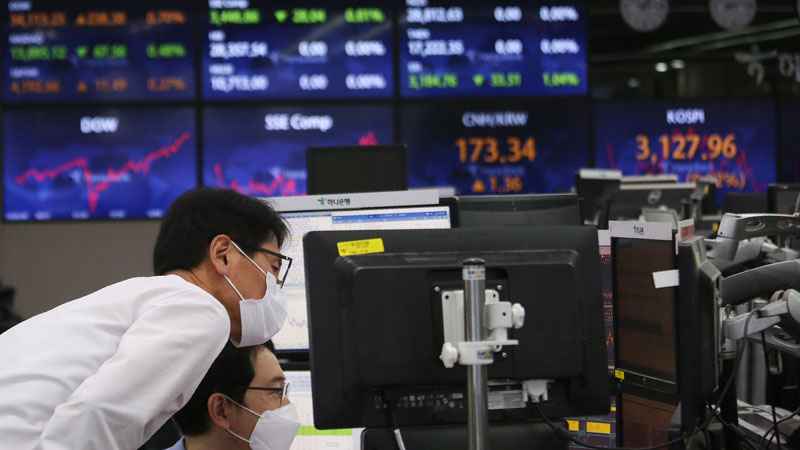Technology shares sink broader market although Dow has gain

Currency traders watch monitors at the foreign exchange dealing room of the KEB Hana Bank headquarters in Seoul, South Korea, Tuesday, May 4, 2021.[AP Photo/Ahn Young-joon]
Technology companies dragged indexes lower on Wall Street Tuesday, pulling the market further from its recent all-time highs.
The S&P 500 fell 0.7%, erasing its gains from last week. Big technology companies like Apple and Microsoft fell as the sector declined for the sixth straight day. Losses in communications stocks and companies that rely on consumer spending also weighed on the market, offsetting gains by financial, industrial and materials stocks. Treasury yields fell slightly.
Investors continue to focus on corporate earnings and on gauging the economic recovery’s progress. Earnings and most economic indicators have been signaling a steady improvement, but investors remain concerned about the lingering threat from COVID-19, inflation and other factors that could crimp progress.
A key concern has been the recovery in the employment market. Investors will get another update with this week’s jobs report.
"The entire market is down, but the tech stuff is down way more," said Ross Mayfield, investment strategist at Baird. "If you look at the broad picture, the earnings beats are strong and we’re expecting a big" jobs number on Friday, he said.
The S&P 500 fell 28 points to 4,164.66. The benchmark index hit an all-time high last Thursday. The technology-heavy Nasdaq Composite dropped 261.61 points, or 1.9%, to 13,663.50. The Russell 2000 index of small-company stocks lost 29.17 points, or 1.3%, to 2,248.29. The Dow Jones Industrial Average fared better than the other indexes. It recovered from an early stumble, adding 19.80 points, or 0.1%, to 34,133.03.
Before this week, stocks had been grinding higher on expectations of an economic recovery and strong company profits this year as large-scale coronavirus vaccination programs help people return to jobs and normal activities after more than a year of restrictions. Massive support from the U.S. government and the Federal Reserve, and increasingly positive economic data, have also helped put investors in a buying mood, keeping stock indexes near their all-time highs.
More than half of the companies in the S&P 500 have reported their results so far this earnings season, which show profit growth of 54%, according to FactSet.
On Monday, Federal Reserve Chairman Jerome Powell said the economic outlook has "clearly brightened" in the United States, but the recovery remains too uneven.
Still, a key concern is whether the economy is strengthening so quickly that it will force the Federal Reserve to raise interest rates to combat inflation, signs of which are already cropping up as higher prices for oil, lumber and other commodities.
Remarks by Treasury Secretary Janet Yellen Tuesday morning appeared to stoke those worries. At an economic seminar, Yellen said interest rates may have to rise to keep the economy from overheating. The selling on Wall Street accelerated following her remarks.
"That is why the sell-off hit tech stocks, especially," said Quincy Krosby, chief market strategist at Prudential Financial. "Many would argue they were overbought and due for a pullback, and anything in this particular environment suggesting that rates could move higher is a negative for Big Tech."
Technology stocks have had a strong runup over the past year. With the market near its recent record highs, the prospect of higher interest rates, which can slow the economy by making the cost of capital more expensive, makes tech stocks look particularly vulnerable.
Apple fell 3.5% and Facebook slid 1.3%. Google’s parent company dropped 1.5% and Amazon lost 2.2%. The declines exacerbated Monday’s drop in tech shares, which caused the Nasdaq to end in the red.
Bond yields fell. The yield on the 10-year U.S. Treasury note dropped to 1.59% from 1.60% the day before.
Investors will get a closely watched jobs report on Friday. Economists expect that U.S. employers hired 975,000 workers last month as the economy accelerated out of the pandemic and vaccines rolled out nationwide. The unemployment rate is expected to drop to 5.8% from 6%.
Also Tuesday, Saudi Aramco said its profits soared by 30% in the first-quarter of the year, compared to last year, on the back of higher crude oil prices and recovering demand as major economies claw their way out of recession.